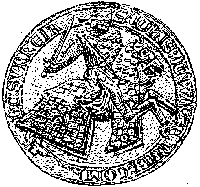|
 In
medieval times the Lord of the Manor of Wakefield had
a tower - the keep at Sandal Castle - overlooking the town from which
he collected taxes. One Lord of the Manor, William, the
third Earl de Warenne died in 1149, fighting the Turks
in what is now Syria. His descendant John, the eighth
and last Earl de Warenne (c. 1286-1347) is depicted
on the seal, left. In
medieval times the Lord of the Manor of Wakefield had
a tower - the keep at Sandal Castle - overlooking the town from which
he collected taxes. One Lord of the Manor, William, the
third Earl de Warenne died in 1149, fighting the Turks
in what is now Syria. His descendant John, the eighth
and last Earl de Warenne (c. 1286-1347) is depicted
on the seal, left.
By the time of the Wars of the Roses, after the Warenne
line came to an end, the Manor became the property of Richard,
Duke of York, who was killed at the Battle of Wakefield, 1460.
In 1483 his son Richard III became Lord of the Manor
of Wakefield but, despite making improvements to his castle here, he probably
never made a Royal visit to the town because he was killed at the Battle
of Bosworth in 1485. His death effectively marks the end of the middle
ages since it brought the Tudor dynasty to the throne.
 Today,
all that has changed; we're no longer fighting in Syria (just on the borders)
and Her Majesty's Inspector of Taxes has now relocated
to a light, airy tower, closer to the centre of Wakefield. I sketched
the view of the Town Hall, County Hall and, in front of them, the rooves
of The Ridings Centre as I waited to check ask if I'd filled in the new
simplified - but still daunting, to me - tax form correctly. Today,
all that has changed; we're no longer fighting in Syria (just on the borders)
and Her Majesty's Inspector of Taxes has now relocated
to a light, airy tower, closer to the centre of Wakefield. I sketched
the view of the Town Hall, County Hall and, in front of them, the rooves
of The Ridings Centre as I waited to check ask if I'd filled in the new
simplified - but still daunting, to me - tax form correctly.
They're really helpful at the tax office and I don't think they throw
you in the dungeon if you get things wrong these days, but it doesn't
harm to check.
If I ruled the world
 I
saw a poster in the Quaker Meeting house promoting the suggestion that
there should be a special form of income tax for those whose beliefs prevent
them from contributing towards war. I'm sympathetic to this but I don't
see how the principle, once established, could work. If it was accepted
that tax payers should have a right not to contribute to some activity
that they believe to be immoral, unjust or untenable, where would it end? I
saw a poster in the Quaker Meeting house promoting the suggestion that
there should be a special form of income tax for those whose beliefs prevent
them from contributing towards war. I'm sympathetic to this but I don't
see how the principle, once established, could work. If it was accepted
that tax payers should have a right not to contribute to some activity
that they believe to be immoral, unjust or untenable, where would it end?
I'd certainly go along with the idea that I don't want my hard-earned
cash to go towards killing any fellow human being, even our worst
enemies, but certainly not innocent civilians caught in the war zone,
but I'd also probably not want my money to go towards promoting the structure
of our economy which is so dependent on oil (itself to some extent a factor,
as I see it, in the recent war we got ourselves into).
For a start they could re-open our local train station . . . 
Richard Bell, richard@willowisland.co.uk
|